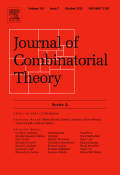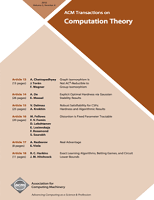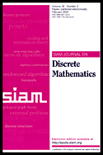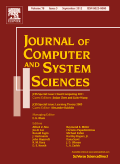
JOURNAL OF COMBINATORIAL THEORY SERIES A
Scope & Guideline
Exploring Innovative Pathways in Theoretical Computer Science.
Introduction
Aims and Scopes
- Combinatorial Structures and Enumeration:
Research on the combinatorial properties of various mathematical structures, including graphs, matroids, and designs, often focusing on enumeration problems and asymptotic behavior. - Algebraic Combinatorics:
Studies that explore the interplay between combinatorial structures and algebraic techniques, particularly through the lens of symmetric functions, polynomials, and representation theory. - Graph Theory and Network Analysis:
Investigations into the properties of graphs, including connectivity, flows, and transitivity, often applying combinatorial techniques to solve complex network problems. - Design Theory:
Research dedicated to the study of combinatorial designs such as block designs and Steiner systems, focusing on their construction, properties, and applications in statistics and experimental design. - Combinatorial Optimization:
Exploration of optimization problems within combinatorial structures, including topics like matching, covering, and packing problems, often utilizing algorithmic and computational approaches. - Combinatorial Number Theory:
Research that combines elements of number theory with combinatorial techniques, addressing problems related to partitions, sums, and sequences.
Trending and Emerging
- Quantum Combinatorics:
A rising trend in the exploration of combinatorial structures through quantum algebraic methods and quantum information theory, indicating a significant interdisciplinary approach. - Applications of Combinatorics in Computer Science:
Increased focus on combinatorial algorithms and their applications in computer science, particularly in fields such as cryptography, network design, and data structures. - Complex Systems and Network Theory:
Emerging interest in the combinatorial aspects of complex systems, including dynamics on networks, which combines combinatorial methods with real-world applications in biology, sociology, and technology. - Algebraic Geometry and Combinatorial Connections:
A growing intersection between algebraic geometry and combinatorial theory, particularly in the study of geometric combinatorics and its implications for combinatorial structures. - Probabilistic Combinatorics:
An uptick in research employing probabilistic methods to tackle combinatorial problems, reflecting a broader trend towards integrating stochastic processes with combinatorial analysis.
Declining or Waning
- Classical Graph Theory:
While still relevant, traditional topics in graph theory such as basic connectivity and classical properties have seen reduced attention as new, more complex graph structures and properties gain traction. - Elementary Combinatorial Identities:
Research focused on basic counting principles and elementary identities appears to be waning, potentially overshadowed by more sophisticated algebraic approaches and computational techniques. - Basic Combinatorial Geometry:
Studies in classical combinatorial geometry, such as those concerning simple geometric configurations and arrangements, are less frequently published as the focus shifts to more abstract and higher-dimensional settings. - Standard Partitions and Simple Sequence Problems:
There is a noticeable decline in papers addressing standard partition theory and basic sequence problems, as researchers increasingly explore more complex and generalized forms of these topics.
Similar Journals

ACM Transactions on Computation Theory
Transforming Ideas into Theory: The Future of Computation.ACM Transactions on Computation Theory, published by the Association for Computing Machinery, is a prestigious journal dedicated to advancing the field of computation theory and theoretical computer science. With an ISSN of 1942-3454 and an E-ISSN of 1942-3462, this journal serves as a vital resource for researchers and professionals seeking to explore groundbreaking developments in computational models, algorithms, and their mathematical foundations. The journal's rigorous standards have earned it a significant position within the academic community, as evidenced by its 2023 category quartiles, ranking in the Q1 category for Computational Theory and Mathematics and Q2 for Theoretical Computer Science. Although it operates through traditional subscription access, it maintains a critical role in disseminating cutting-edge research and fostering collaboration among experts in the United States and beyond. As an influential platform, ACM Transactions on Computation Theory is committed to contributing to the ongoing dialogue and advancement of computation theory, making it essential reading for anyone passionate about this dynamic field.

CANADIAN JOURNAL OF MATHEMATICS-JOURNAL CANADIEN DE MATHEMATIQUES
Exploring the frontiers of mathematical research.Canadian Journal of Mathematics - Journal Canadien de Mathématiques is a prestigious peer-reviewed journal published by Cambridge University Press, which aims to advance the field of mathematics through the dissemination of high-quality research articles. With its ISSN 0008-414X and E-ISSN 1496-4279, the journal plays a pivotal role in fostering mathematical research and collaboration. It has been recognized for its impactful contributions, currently holding a category quartile ranking of Q2 in Mathematics (miscellaneous) for 2023 and sits in the 66th percentile among its peers according to Scopus rankings. As the journal continues its convergence from its inception in 1994 through to 2024, it remains a vital resource for researchers, professionals, and students seeking to stay at the forefront of mathematical developments. The journal does not operate under an open access model, allowing for a curated collection of articles that adhere to rigorous academic standards.

SIAM JOURNAL ON DISCRETE MATHEMATICS
Unveiling the complexities of discrete structures.SIAM Journal on Discrete Mathematics is a premier academic journal dedicated to the publication of high-quality research in the field of discrete mathematics. Published by SIAM Publications, this journal features original research articles covering a broad range of topics, including combinatorial optimization, graph theory, and algorithm design. With an impressive impact factor placing it in the top quartile (Q1) of mathematics journals, it is a valuable resource for researchers and practitioners looking to stay abreast of the latest advancements in discrete mathematics. Although currently not open access, the journal commits to disseminating rigorous and impactful findings that advance the understanding of mathematical concepts and their applications in various scientific domains. Renowned for its rigorous peer-review process, the SIAM Journal on Discrete Mathematics serves as an essential platform for scholars aiming to contribute to this evolving field, making it a must-read for anyone involved in mathematical research.

DISCRETE APPLIED MATHEMATICS
Advancing the Boundaries of Discrete Mathematics.DISCRETE APPLIED MATHEMATICS, published by ELSEVIER, is a premier journal dedicated to advancing the fields of Applied Mathematics, particularly focusing on Discrete Mathematics and Combinatorics. Since its inception in 1979, the journal has established itself as a vital resource for researchers and practitioners alike, achieving a commendable Q2 ranking in both applied and discrete mathematics categories as of 2023. With an ISSN of 0166-218X and an E-ISSN of 1872-6771, the journal serves an international audience by disseminating significant findings and fostering innovation in mathematical applications. Its Scopus ranking positions it notably within the top tier, ranking #23 out of 92 in Discrete Mathematics and Combinatorics, highlighting its impact in the academic community. Although the journal is not open access, it remains accessible through institutional subscriptions. Researchers, professionals, and students are encouraged to engage with the relevant and rigorous research published in this esteemed journal, as it plays a crucial role in shaping the future of mathematical sciences.

DISCRETE MATHEMATICS
Pioneering research in discrete mathematics and beyond.DISCRETE MATHEMATICS, published by Elsevier, is a leading journal dedicated to the field of discrete mathematics and combinatorics, with a distinguished presence in the academic community since its inception in 1971. With an ISSN of 0012-365X and an E-ISSN of 1872-681X, this esteemed journal has firmly established itself within the Q1 category for Discrete Mathematics and Combinatorics, and Q2 for Theoretical Computer Science as per the 2023 metrics, underscoring its pivotal role in advancing research in these vital areas. DISCRETE MATHEMATICS is highly regarded, reflected in its Scopus rankings, where it stands at #44 out of 92 in its primary category, contributing significantly to the global discourse on complex mathematical theories and applications. Published from the Netherlands, the journal serves as a crucial resource for researchers, professionals, and students looking to stay informed about the latest innovations and methodologies in discrete mathematics. Though currently not an open-access journal, DISCRETE MATHEMATICS continues to foster a vibrant scholarly community through rigorous peer-reviewed research, promoting a deeper understanding of the mathematical structures that underpin both theoretical and applied science.

JOURNAL OF ALGEBRAIC COMBINATORICS
Fostering scholarly dialogue in the realm of algebraic combinatorics.JOURNAL OF ALGEBRAIC COMBINATORICS, published by SPRINGER, stands as a premier resource in the fields of algebra and combinatorics, playing a pivotal role in advancing research in these disciplines. With an esteemed impact factor reflective of its academic rigor, it holds a prestigious Q1 ranking in both Algebra and Number Theory, as well as in Discrete Mathematics and Combinatorics, according to 2023 assessments. Established in 1992, this journal features contributions from leading experts worldwide, offering insights into the latest developments and methodologies. Although not an open-access journal, it provides a wealth of valuable information and research findings focusing on combinatorial structures, theory, and applications that are essential for advancing academic inquiry. As a vital publication for researchers, professionals, and students alike, JOURNAL OF ALGEBRAIC COMBINATORICS continues to shape the conversation within the mathematical community and beyond, making it indispensable for those engaged in the dynamic landscape of mathematical sciences.

Journal of Integer Sequences
Advancing Discrete Mathematics: Your Gateway to Integer Sequence ResearchJournal of Integer Sequences, published by University of Waterloo, stands as a vital resource within the field of Discrete Mathematics and Combinatorics. This open-access journal, which has been in circulation since 1998, is dedicated to the study and dissemination of research concerning integer sequences, a fundamental aspect in various mathematical disciplines. With a current impact factor reflected by its Q3 ranking in the 2023 category of Discrete Mathematics and Combinatorics, the journal enhances its visibility through a dedicated approach to scholarly excellence and engagement with cutting-edge research. Positioned in Canada, the journal encourages contributions from researchers, professionals, and students alike, fostering a collaborative environment where innovative mathematical ideas can flourish. Explore the depths of integer sequences and their applications by accessing this journal for vital insights and advancements in the field.

Discrete Mathematics Letters
Connecting ideas in Discrete Mathematics and beyond.Discrete Mathematics Letters is a prominent open-access journal dedicated to advancing the field of Discrete Mathematics and Combinatorics, published by Shahin Digital Publisher. Since its inception in 2019, this journal has rapidly established its presence in the academic community, securing a respectable Q2 category ranking in the 2023 Scopus database, positioning itself at rank #45 out of 92 in its field, making it a valuable resource for researchers and practitioners alike. With a commitment to disseminating high-quality research, Discrete Mathematics Letters provides an accessible medium for sharing innovative ideas and findings within the mathematical sciences, ensuring that researchers, students, and professionals stay informed about the latest developments. As an open-access journal, it provides free access to publications, fostering collaboration and knowledge exchange among the global research community.

JOURNAL OF COMBINATORIAL OPTIMIZATION
Bridging theory and application in combinatorial studies.JOURNAL OF COMBINATORIAL OPTIMIZATION, published by Springer, stands at the forefront of research in the fields of applied mathematics, computational theory, and combinatorial optimization. With an ISSN of 1382-6905 and E-ISSN of 1573-2886, this esteemed journal serves as a vital platform for groundbreaking studies and methodologies from 1997 to 2024. Notably positioned in the Q3 quartile across several categories, including applied mathematics and discrete mathematics, it reflects a commitment to high-quality research that pushes the boundaries of knowledge in quantitative analysis and algorithm development. Although it does not offer open access, its visibility and impact are underscored by impressive Scopus rankings, such as the 67th percentile in discrete mathematics and combinatorics. The journal aims to foster a comprehensive understanding of combinatorial optimization and its applications, making it an indispensable resource for researchers, professionals, and students eager to stay abreast of the latest trends and advancements in these dynamic disciplines.

JOURNAL OF COMPUTER AND SYSTEM SCIENCES
Pioneering insights in computer science and systems analysis.The Journal of Computer and System Sciences is a distinguished publication founded in 1967 and continually striving to push the boundaries of knowledge in computer science and applied mathematics. Published by Academic Press Inc, Elsevier Science, this journal boasts impressive credentials, holding a Q1 quartile ranking across multiple categories including Applied Mathematics, Computational Theory and Mathematics, Computer Networks and Communications, and Theoretical Computer Science as of 2023. With a focus on innovative research and comprehensive theoretical developments, this journal serves as a pivotal forum for authors and readers alike, facilitating cutting-edge contributions to the field. The journal is not currently open access, providing a curated selection of high-quality articles for its subscription residents. By engaging with this journal, researchers, professionals, and students can gain insight into the latest trends, prominent methodologies, and significant findings that shape the modern landscape of computing and systems analysis.